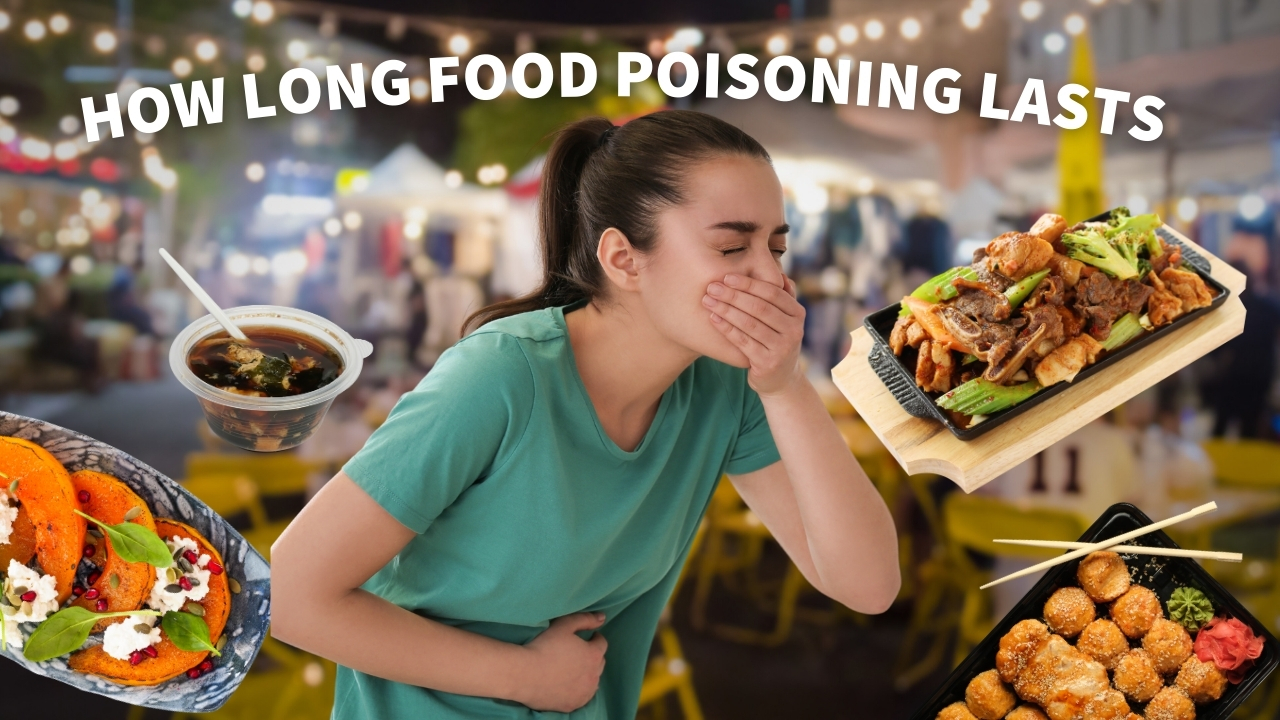
Food poisoning duration varies depending on its cause. Most people recover within 12 to 48 hours, but symptoms may persist for more than a week in some cases. Severe and long-lasting complications can also occur. Food poisoning duration varies depending on its cause. Most people recover within 12 to 48 hours, but symptoms may persist for more than a week in some cases. Severe and long-lasting complications can also occur.In this article we will learn about How Long Food Poisoning Lasts and What To Do About
What Is Food Poisoning?
Food poisoning is caused by consuming contaminated foods or beverages. It affects about one in six people in the United States annually. Common symptoms include:
- Diarrhea
- Fever
- Nausea
- Vomiting
Food Poisoning vs. Stomach Flu
While food poisoning and stomach flu share similar symptoms, food poisoning results from consuming food or drinks contaminated with pathogens like bacteria, viruses, or parasites. These pathogens multiply in the body, causing symptoms such as:
- Diarrhea
- Fever and chills
- Nausea
- Stomach pain
- Vomiting
Some symptoms, such as rashes or swelling, may mimic allergic reactions. For example, scombroid fish poisoning occurs due to fish contaminated with histamine, while botulism is a severe condition caused by improperly canned foods or bacteria spores.
How Long Does Food Poisoning Last?
The duration of food poisoning depends on the organism causing it. Below are some common pathogens and their timelines:
| Organism | Onset Time | Duration | Common Sources |
|---|---|---|---|
| Staphylococcus aureus | 30 min to 8 hours | 24 to 48 hours | Foods not cooked after preparation |
| Salmonella | 6 hours to 6 days | 4 to 7 days | Raw or undercooked meat and eggs |
| Norovirus | 12 to 48 hours | 12 to 60 hours | Raw produce, shellfish |
| Clostridium botulinum | 12 to 72 hours | Variable | Improperly canned foods |
| E. coli | 3 to 4 days | 5 to 10 days | Raw produce, sprouts, contaminated water |
Risk Factors for Severe Symptoms
Certain individuals are at higher risk of severe food poisoning, including:
- Adults aged 65 and older
- Infants and children under 5
- People with weakened immune systems
- Pregnant individuals
Causes of Food Poisoning
Food poisoning is caused by various pathogens, including:
- Bacteria: Salmonella, E. coli, Campylobacter
- Viruses: Norovirus
- Parasites: Cyclospora
- Toxins: Found in certain fish or shellfish
Pathogens may spread through improperly cooked food, contaminated surfaces, or person-to-person contact.
What To Do If You Have Food Poisoning
Most cases of food poisoning resolve on their own, but managing symptoms is essential for recovery.
1. Stay Hydrated
Dehydration is a common complication of food poisoning due to diarrhea, fever, and vomiting. Symptoms of dehydration include:
- Dark urine
- Fatigue
- Dizziness
- Dry mouth
Drink water, diluted juices, sports drinks, or broths to replenish fluids and electrolytes.
2. Eat Bland Foods
The BRAT diet (bananas, rice, applesauce, and toast) can soothe the stomach and provide energy. Gradually reintroduce nutrient-rich foods as symptoms improve.
3. Consider Medications
- Over-the-counter remedies like Imodium or Pepto-Bismol can ease diarrhea.
- Probiotics may support digestive recovery.
- Consult a healthcare provider for severe cases to receive antibiotics, antiemetics, or antiparasitic treatments.
Food poisoning can last anywhere from a few hours to several days, depending on the specific infecting organism and the individual’s immune response. It is important to seek medical attention if symptoms persist or worsen, as complications can arise.
Seek medical attention if you experience:
- Bloody diarrhea
- Persistent diarrhea lasting over three days
- High fever above 102°F (39°C)
- Severe dehydration
- Inability to keep fluids down
Prevention Tips
Follow these steps to reduce the risk of food poisoning:
1. Clean
- Wash hands before cooking and after handling raw ingredients.
- Clean fruits, vegetables, and kitchen surfaces thoroughly.
2. Separate
- Keep raw meat separate from vegetables and cooked foods.
3. Cook
- Use a food thermometer to ensure proper cooking temperatures:
- Meat: At least 140°F
- Poultry: 165°F
4. Refrigerate
- Store leftovers promptly. Avoid leaving food out for more than two hours, or one hour in temperatures above 90°F.
A Quick Review
Most food poisoning cases are mild and resolve within a week. However, severe cases can result in complications such as nerve or organ damage, meningitis, or pregnancy issues. Young children, elderly adults, and those with weakened immune systems are more susceptible to complications.
Safe food handling practices can significantly reduce the risk of foodborne illnesses.



